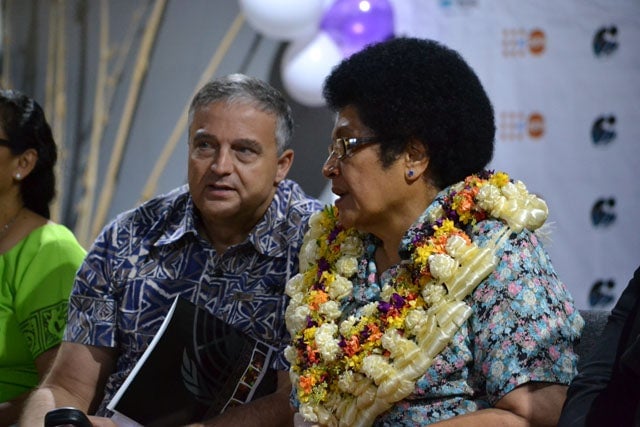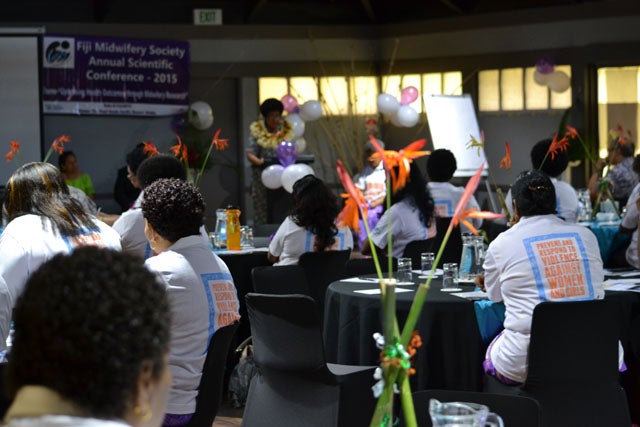Fiji has notched another first as the first Pacific country to have a gender-based violence guideline for comprehensive case management, after it was launched December 5 (2015) by the Speaker of the Fiji Parliament Dr Jiko Luveni.
To be used by health workers, the guideline will ensure a uniform approach by all those involved when cases that have elements of gender-based violence present themselves.

The guideline entitled Responding to Intimate Partner Violence and Sexual Violence against Women and Girls cover a basic understanding of gender-based violence (GBV), the role of health systems in the response to GBV, clinical management (as in the immediate health care response to GBV) and referral pathways.
The guideline is part of a general health system strengthening based on findings of violence against women prevalence studies conducted in Pacific island countries - 10 so far. Both activities are supported by the United Nations Population Fund (UNFPA) Pacific Sub-Regional Office.
The guideline was launched during the 16 Days of Activism to End Gender Violence, at the annual Fiji Midwifery Society annual scientific conference. There has been much appreciation for the guidelines which Midwifery Society president Matron Aliote Galuvakadua says will protect nurses as well.
"What we as health workers, as nurses and midwives, appreciate very much is that now there we have something in black and white; we can make reference to it and it covers a very wide range of relevant issues," Matron Galuvakadua said.
Previous counselling sessions were threatened by perpetrators belittling nurses' counsel, being condescending as having no basis of their advisories but with the guideline, Matron Galuvakadua said there would now be a lot more confidence in their guidance.
Matron Galuvakadua who as Matron-in-Charge of the Colonial War Memorial (CWM) Hospital Maternity Unit and head of the midwifery society said with 95 per cent of the staff she overseas being women, the guideline was crucial for GBV issues even amongst nurses themselves.
"However we need to take this guideline down to community level. The general public need to know that we now have steps that will have to be followed once a case has been presented to us. The guideline has been very well-received," Matron Galuvakadua said.
The community awareness concern stems from the practice of traditional apology which cause reluctance of the families of pregnant minors for example, who come through the health system and are required to provide more details and information, under law relating to the sexual abuse of minors.
When launching the guideline, Dr Luveni commended the Ministry of Health and Medical Services for "taking up the challenge to ensure that issues pertaining to violence against women and girls that has major impact on poverty and inequality are addressed through the Health Care Systems".
"Violence against women and girls (VAW) is a widespread and systematic violation of fundamental human rights, an enduring form of gender-based discrimination that hinders economic growth and limits the well-being of individuals," Dr Luveni who is also the UNFPA Pacific Regional Champion said.
"It is the responsibility of all individuals in Fiji to fight against this cycle of violence against women and girls."
Globally, over 140 million girls and women have undergone some form of female genital mutilation. In developing countries, one in every three girls is married before reaching 18, and one in nine before 15. The studies in the Pacific report that approximately a third of women's first sexual experience was coerced or forced - 38 per cent of women in Solomon Islands and 28 per cent of women in Vanuatu.
In terms of the forms of violence inflicted, studies in Fiji (64 per cent), Solomon Islands (64 per cent), Kiribati (68 per cent), and Vanuatu (60 per cent) showed a higher level of physical and/or sexual violence by partners and husbands while Samoa (62 per cent) and Tonga (68 per cent) showed higher levels of physical violence from a non-partner, for example, family members.
In most countries, fewer than four in 10 survivors of such violence seek help. Violence against women and girls includes domestic and sexual violence, human trafficking and harmful practices, such as forced child marriage, gender-based infanticide and female genital mutilation.

Generally-speaking, many women do not tell anyone about the violence or abuse they have experienced, and in most cases the vast majority do not seek help from formal services. For example, in Solomon Islands, 82 per cent of women who had reported experiencing abuse did not seek help from formal services or people in authority; 70 per cent never told anyone at all.
Acting Ministry of Health and Health Services Permanent Secretary Dr Mecuisela Tuicakau labelled the guideline "comprehensive and (an) easy reference package for any assistance" in his Foreword of the guideline.
The guideline includes all relevant legal frameworks, in terms of GBV. Health workers involved in the management of GBV cases are also provided with guidance on the collection of evidence and giving evidence in court, it also links health workers to all social support services GBV survivors can consider.
UNFPA Pacific Director and Representative Dr Laurent Zessler commended midwives at the launch for their and their colleagues' tireless work in the area of maternal health, including the critical contribution retired midwives made to the response to Cyclone Pam earlier this year in Vanuatu.
"This is a huge milestone for Fiji though with implications of a regional progress given Fiji's leadership in this area: no other Pacific island country has a GBV medical guideline yet as UNFPA is working with other which have expressed interest in having one," Dr Zessler said.
"UNFPA is pleased to be closely associated with the ongoing development of midwives and midwifery services in Fiji and across the region in recognition of the critical role they place in safe deliveries and motherhood."


